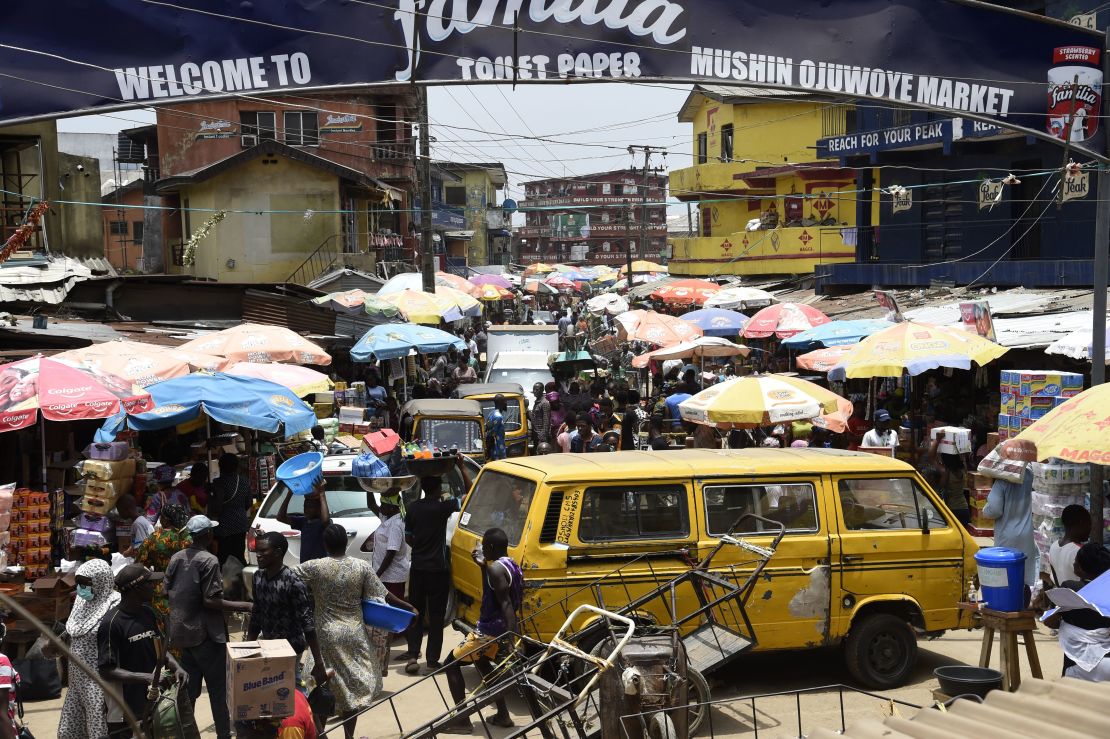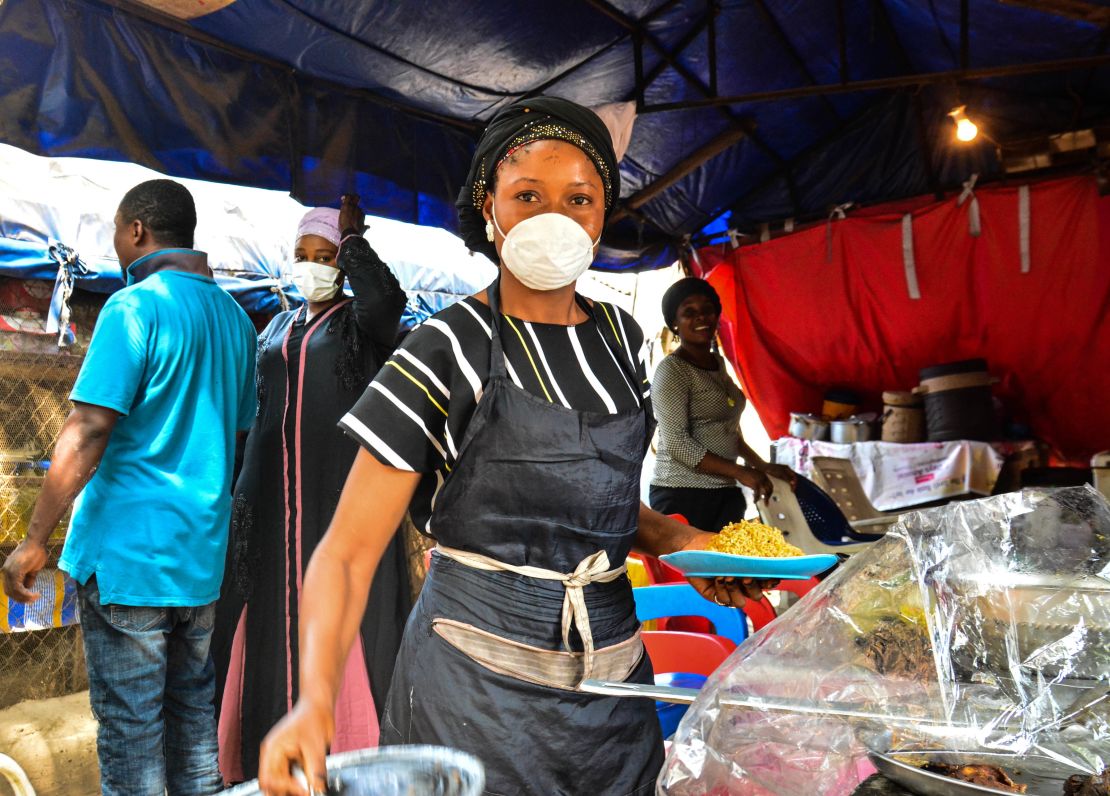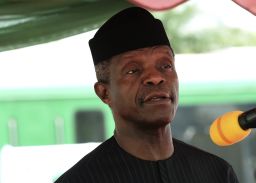Many countries in Africa are imposing lockdowns on their citizens as they race to curb the spread of coronavirus. But it has further highlighted the wide gulf between rich and poor, as it becomes apparent that the practicalities of social distancing and lockdowns are a privilege millions of people in Africa simply cannot afford.
On Monday night, Nigeria became the latest country on the continent to impose a 14-day lockdown in major states across the country as President Muhammadu Buhari invoked a law from the country’s colonial era.
But the millions of Nigerians such as food vendors, hairdressers, cleaners, and others who earn their wages daily and make up the informal job market, say they are faced with stark choices.
‘We don’t work, we don’t eat’
Cecilia Achonwa runs a local roadside restaurant in Yaba, a suburb in Lagos mainland selling affordable lunch packs to students and local businesses.
Before coronavirus, her food business saw lines of people forming to buy their meals. Now they are all gone and her business has almost collapsed, she says.
The 53-year-old says she is responsible for the welfare of five chefs who were hired from neighboring West African country Togo.
“What they are managing now is their allowance and the remaining foodstuff that I had stocked at the restaurant to sell this month when that finishes, we’ll have nothing,” she told CNN.
In the lead up to the shutdown, Lagos, a bustling metropolis with around 20 million people, was thronging with crowds as shoppers raced around to stock up to beat the 11 p.m. deadline set for the shutdown of the city against coronavirus.

But many could barely afford to stock up as prices had increased.
“Some people are shouting, they are crying and going home without buying anything. Things are too expensive,” Felicia Emmanuel, a trader at the Obalende market told CNN.
“It’s bad ooo, a lot of people, it’s the profit they make per day is what they will eat. As they are shutting down now, I wonder what it will look like, hungry will kill some people. We pray that government should do something about it. We are begging them, they should help us,” she added.
Another resident Abiodun Gaji told CNN. “There are no provisions, no facilities made available for us to cook. So people are panic buying goods and food … It’s crazy. People are hungry, some people, millions of people depend on daily sales. They don’t make sales, they don’t eat.”
A local food seller in Abuja, Nigeria’s capital declined to be named, but told CNN: “I cannot afford to stay at home and not feed my children. I know it is risky to be out here, but if I don’t come out to look for what to feed my family, we will die of hunger faster than being killed by the virus.”

Another challenge facing Lagosians and others like them around the country is that Nigeria’s power infrastructure is weak and blackouts are frequent.
One shopper, Amaka, a bank worker says she does not want to buy too much as she will end up trashing the items.
“There is no light and you can’t preserve items. We don’t have steady light in Nigeria and in my area too. We hope this ends as soon as possible. We are all buying out of fear because you can’t go to the market everyday. We just hope it will be over soon.”
Food distribution
Efforts are being made to help ease the burden of the lockdown on vulnerable members of society, Nigeria’s government says.
Lagos State governor, Jide Sanwo-Olu is facing his first major crisis since he was elected last year and is being widely praised for his efforts in handling the crisis.
He says his administration will distribute food to 200,000 homes with an estimated six people per household, as a start. However, millions more live in extreme poverty in the city.
At a special briefing attended by CNN, the country’s vice president said the welfare of the most vulnerable members of society was important to the President, adding that he had issued a 10 billion Naira grant ($25 million USD) to Lagos, which is the epicenter of coronavirus in Nigeria, with 81 cases of the 131 announced as of Monday morning.

“The President constituted an economic sustainability committee on how to alleviate sufferings of Nigerians at this time,” Yemi Osinbajo said. “The committee is to take care of the economic challenges and fallout of the pandemic,” he added.
The country’s humanitarian minister also announced Monday that cash transfers were being paid to the poorest households.
Millions of dollars have also poured in from wealthy individuals such as Africa’s richest man Aliko Dangote and corporations.
However in Ikorodu, a low-income community on the outskirts of Lagos, the promises of the committee seem far away.
“We are hungry, we are hungry,” a throng of angry women gathered, unable to purchase any food items.
Among them is popular Lagos businesswoman and fashion designer Toyin Lawani.
Lawani, who runs 33 businesses from a single building in Lekki, Lagos, has been distributing food packs, hand sanitizers and masks that she produced in her factory.
She told CNN: “I had to come here because most of my staff are from here and they told me about this situation.”
Overpopulated communities
Nigeria, which has the largest number of people living in extreme poverty in the world, has inadequate housing stock which has been described as a “complete crisis,” by the United Nations.
“Informal settlements are ballooning where conditions are inhumane and perhaps the most severe I have seen worldwide,” Leilani Farha, special rapporteur on adequate housing last year, said last year.
Many families live in one or two-bedroom apartments known colloquially as ‘face-me-I face-you,’ tenement style homes where residents share a communal bathroom and kitchen spaces.
Social distancing becomes near impossible in such conditions.
Abdulwahab Abubakar, a motion designer, says he had to leave his home in Shomolu, a largely populated region in Lagos.
“I left because it is cramped up and it is almost impossible to avoid people there. I also wanted to be with family, I cannot imagine what it would feel like being alone at this time,” he told CNN.
Abubakar said at the time he moved from his community, residents were oblivious to the rules of social distancing as they went about their daily lives as normal.
Political elite and coronavirus
There are a lot of uncertainties about coronavirus but what is clear is that millions of poor people’s lives are at risk in Nigeria from a disease spread by wealthier members of society as they traveled around the world.
“Every single case I have heard about is from someone returning from abroad, someone who can afford to go abroad. The other cases are from contact with those who returned and did not self-isolate,” says Rolayo Subair, a legal researcher from Lagos.
Many of those diagnosed with coronavirus have been among Nigeria’s elite and top politicians, many of whom continued to attend conferences, birthday parties, and high profile events globally.
Some of the country’s lawmakers also violated screening procedures and failed to self-isolate prompting the President’s chief of staff, Abba Kyari to raise an urgent public health warning in a memo.
In a twist of fate, Kyari confirmed Monday in a statement posted on Twitter that he too had tested positive for coronavirus upon his return from a meeting in Germany.
Seyi Makinde, the governor of Oyo State, attended a political rally on March 18 where he was filmed making light of coronavirus dressed in his party colors. He announced Monday that he had tested positive for Covid-19.
There are fears of community spread in Nigeria if there is inadequate contact tracing due to some leaders not disclosing their diagnosis.
Civil society group EiENigeria, recently issued a statement calling on “Nigeria’s representatives and elites to come forward openly and honestly if they or their staff, extended family members … have had COVID19 exposure … to make sufficient information available for all necessary urgent contact tracing.”
As legal researcher Subair puts it, “If these people are nice enough to self-isolate, I think those who did not travel won’t have anything to worry about.”
CNN’s Bukola Adebayo and Lucky Yusuf contributed to this report




















